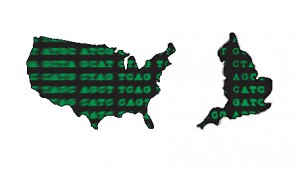From One Hundred Thousand Genomes in the United Kingdom to Millions of Genomes in the United States: What Lessons Can we Learn?
Posted on byIn recent years, the United Kingdom (UK) has made a major commitment to developing a large scale population cohort study (100,000 genome project), linking high quality genomic sequence data to electronic health record information for the purposes of scientific discovery and clinical care improvement. The plan is for this project to continue well into the future and to be distensible, adding new types of biological information over time, including transcriptomic, proteomic, metabolomics, and epigenetic information. The project is expected to yield valuable scientific insights on the molecular underpinnings of health and disease states. The potential for acceleration of scientific discovery is of great interest to the genomics and broader biomedical research communities and justifies considerable public expenditure in the minds of substantial numbers of genomic scientists.
At the October 2016 meeting of the American Society of Human Genetics, leadership from the UK’s National Health Service (NHS) reported on the progress of the 100,000 Genomes project and how to prepare the health system to make use of genomic medicine. From these presentations it appears that scientific and health services leadership in the UK are well on their way to developing a robust national program that addresses long term needs regarding data collection and interpretation as well as delivery of care. The model includes a distributed network of 13 regional Genomic Medicine Centers staffed with individuals with scientific, clinical, and educational expertise that support the initiative. Further, the NHS has developed a comprehensive suite of approaches to education needs of the NHS over both the short and long term. Near term approaches include extensive online and print resources targeting the public, front line providers, and researchers involved in the cohort project as well as those in the entire NHS population. Further, there are ongoing efforts to provide specific training and quality improvement programs, for individuals such as pathologists responsible for data and sample collection for the biobank associated with the cohort. Longer-term activities include development of relationships and commitments to improving genomics and precision health education by the national organizations in the UK responsible for training diverse provider types at all learning levels. Also, there is an already productive effort to develop additional pipeline capacity for health professional workforce development including new programs for genetic counselors, bioinformatics specialists, and PhD level researchers that will be needed over the coming decades to meet the needs of a health system pivoting towards a more precision medicine based approach to caring for the UK population.
In all, the progress the UK has made in preparing its health system to embrace the 100,000 Genomes Project over a few short years seems quite remarkable. In fact, it seems that there is a commitment to make the project an organizing hub for overhauling their health system to lead in the 21st century in both genomics research productivity and precision medicine.
How can we learn from the UK progress in implementing similar initiatives in the United States? While the UK effort is highly coordinated and centralized, the emerging picture in the United States is more complex. Here, many private (Click here for one example) and public cohorts are developing, each differing in priorities, pace, and approaches, which could lead to millions of genomes sequenced in the next few years (see table). The U.S. Precision Medicine Initiative led by the National Institutes for Health has made quick advances in less than 2 years after initial launch. Progress has occurred in defining the scope of the initiative, framing its guiding principles and providing an initial bolus of resources to organizations and groups for recruiting research participants. National survey data suggest the public is excited and supportive about this initiative.
These are early days and it may be difficult to envision how a coordinated transformation of the U.S. health system will occur to deliver precision health. Perhaps the “many flowers blooming” approach will ultimately work well, and may be the only feasible approach given the realities of the U.S. health system. Nevertheless, all stakeholders including biomedical research, education, as well as the health services and public health communities should be closely following how successful cohorts and health systems are evolving in the UK and elsewhere. We might find that we have a thing or two to learn.
Posted on by



